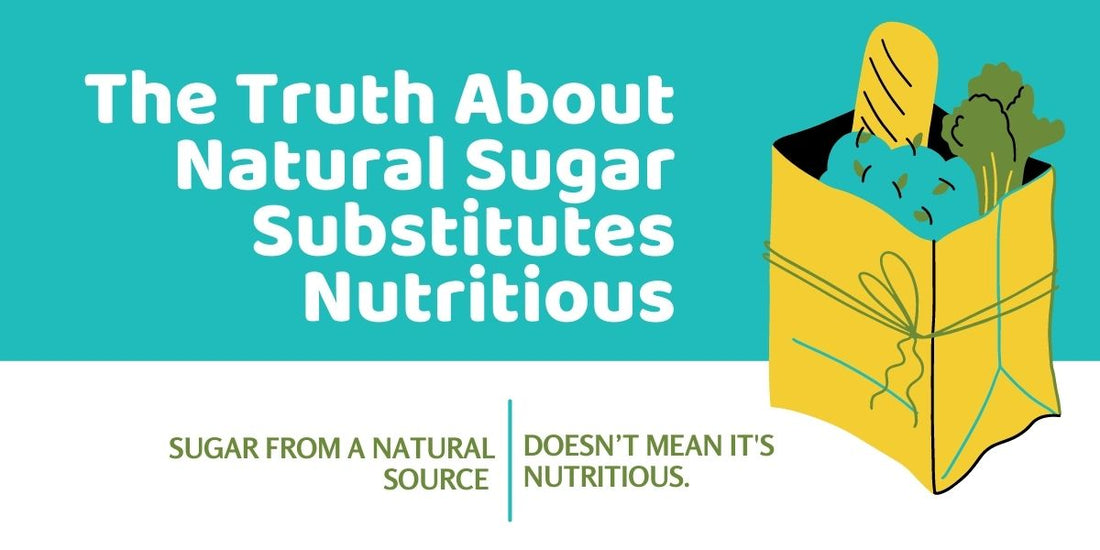
The Truth about So Called "Healthy Sugar Substitutes." Which Ones Are Truly Healthy?
Share

The Truth About So Called, “Healthy Sugar Substitutes.” Which Ones Are Truly Healthy?
Choosing a healthy sugar substitute to white processed sugar can be a grueling task. It can be confusing trying to decipher the truth through the proclaimed health benefits on all the colorful packaging. What exactly constitutes a healthy sweetener? Is it low calories, nutritional content, glycemic index, or whether it is naturally sourced make a sugar substitute healthy?
Let’s take a deeper look into these issues to clear up some confusion and help you stay informed so that the decision can be an easier one for you.
Why Sugar's Nutrition and the label ‘Natural’ Mean Different Things
When choosing healthy sugar substitutes, you want to dig deep to find out how natural the sugar really is. The term “natural” is not regulated by the FDA, and so doesn’t carry with it much substance. It is nonchalantly thrown around in the world of food. What does “natural” actually mean? “Natural” is how true something is to its original form. For sugar, this includes where the sugar comes from and to what degree it is processed.
Why is this important when it comes to sugar? The more natural a sugar is, the less processed it is. Meaning, more nutrients from its original natural source remain intact because it has been minimally changed. Therefore, the more a sugar remains intact in its whole food form, the more natural it is.
Take care when you see “natural” on the package. Many sugars claim they are natural, but most health-promoting properties are extracted during the processing phase. So, few sweeteners actually contain any nutritional value from the original whole food source in final form. An example of this is Stevia. Stevia is from a natural source, but not nutritious because it is highly processed.
Believe it or not, there are a few sweeteners that actually do contain some nutrition. Date sugar, blackstrap molasses, maple syrup, date syrup, and honey contain nutrition in varying quantities due to the fact that they are less processed. It goes without saying, artificial sweeteners are void of nutrition, similar to white sugar, because they are highly processed.
Why a High Glycemic Index Can be Harmful
When searching for a healthy sugar, you want one with a low glycemic index (GI). This is especially important for diabetics. The glycemic index is how quickly a carbohydrate raises blood sugar (glucose) levels on a scale from 0-100. Anything below 55 is considered low, while anything above 70 is considered high.

When you eat sugars with a high glycemic index, you are more at risk for gaining weight because your blood sugar level increases quickly and the energy from the sugar diminishes quickly, causing a sugar crash and leaving you feeling hungry. If you consume fructose sugar from a fruit, more than likely it will be accompanied with fiber from that fruit. This is important because the fiber slows down the absorption of the sugar into the blood stream. In addition, consuming fructose from fruit provides you with the necessary vitamins and minerals that your body craves.
Because sugars from fruits come from fructose, they naturally yield a lower glycemic index, so sugar from fruits can be some of the better sweetener options.
Are All Calories the Same?
Traditionally, people have chosen healthy sugar substitutes based solely on whether a sugar substitute is zero calorie. What they don’t know is that many of these zero-calorie sugars can have serious adverse health effects, making them dangerous options. (See our blog about Zero Calorie Sugars for more information).
We all need calories, and consuming too few good calories or consuming empty calories can leave a person feeling hungry and without energy. This can actually cause a person to overeat, because they aren’t getting full from the calories they are consuming.It’s not about how many calories, but the quality of calories we consume.

Make sure the calories you are putting into your body are loaded with nutrition. In order that a food retain its nutrition, it must be minimally processed and come from a whole food, as previously stated. When it comes to sugar, it’s best to choose a sugar substitute that comes from a whole food and contains large amounts of fiber so that you are getting the maximum amount of nutrition.
How to Choose a Sugar Substitute Wisely
So what is the truth about some of the proclaimed ‘natural’ sugar substitutes on the market today? Check out this chart of different sugars to see the difference.


- Maple Syrup: Is it Healthy?
- Honey: Is it Harmful to Your Health?
- Blackstrap Molasses: Ranked #2 for Antioxidants
- Agave Syrup: an Unsafe Option
- Coconut Sugar: Not as Healthy as You Might Think
- Cane Sugar: Not a Good Option
A New Sugar Substitute on the Market: Date Sugar
Date sugar is simply dried dates with the pits removed, ground into sugar. Next to honey, this is the most minimally processed sugar on the market—so date sugar contains almost all the nutritional value as the original superfruit. There is no other all-natural, minimally-processed sugar like it on the market.

Date sugar has 45x more antioxidants when compared to its partners, making it comparable to berries. Dr. Michael Greger ranks date sugar as the healthiest sweetener on the planet! It is an excellent source of fiber, promoting healthy digestion and reducing cholesterol levels, and thus decreasing the risk of heart disease. Date sugar also has magnesium, iron, calcium, potassium, and is rich in other B vitamins such as Folate and Niacin. Pharmacist Divya Jacob suggests eating a handful of dates every day in order to get all the essential nutrients.
Date sugar has a third less calories than white sugar, but the calories it does have are solely from the fruit. Because sugar from fruits digest slowly, it allows you more time to burn the calories from consumption and distribute them evenly throughout the day. This gives you the slow release of energy you need to keep going for a longer period of time, and eliminates that unwanted sugar crash.
Date sugar has a low glycemic index (between 40-50), making it an ideal option for diabetic patients, and is from an all-natural source, the date palm. It qualifies as one of the best options for a sugar substitute, but has unfortunately been a well-kept secret for far too long! For some great date sugar recipes, check out the recipe section of our website. Remember to decrease dry ingredients and increase the amount of liquids when using a traditional recipe.
Date Syrup, An Exciting Alternative
Date syrup, like date sugar, is a newer product that you can now find on the shelves of grocery stores. Date syrup doesn’t have as many of the nutritional benefits as date sugar because it is minimally processed by boiling dates with water. During this process, the fiber is removed. However, date syrup does contain more nutrition than any of the other mentioned sugar substitutes (with the exception of calcium, of which maple syrup includes more). Date syrup contains a bit more calories than date sugar per serving, but overall is a very healthy option and dissolves nicely in your tea or coffee.

The Solution to your Sugar Troubles
At PurDate, we’re passionate about nutrition and helping you have access to some of the world’s healthiest sugar. That’s why we make date sugar! Try it out by sprinkling it on your oatmeal, fruit, and yogurt parfait. You can even check out our recipes and start baking with it!
